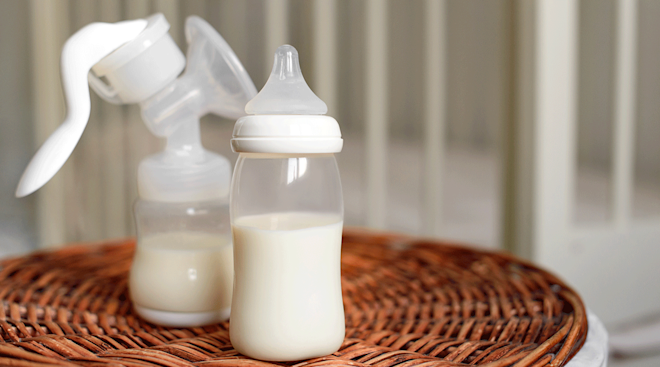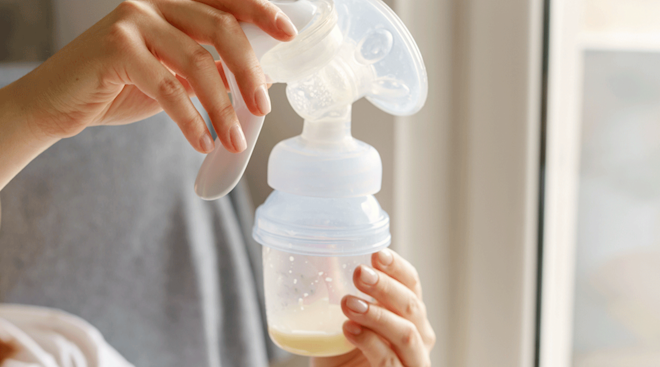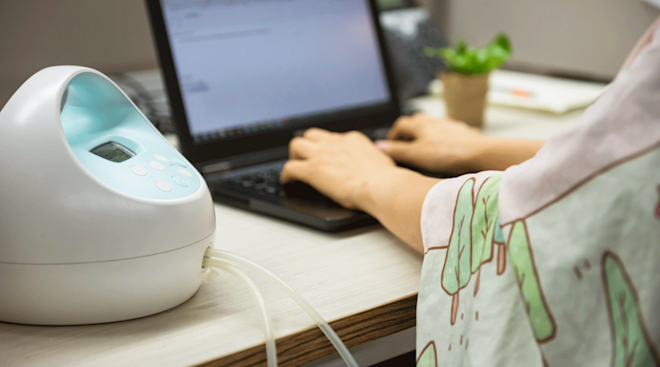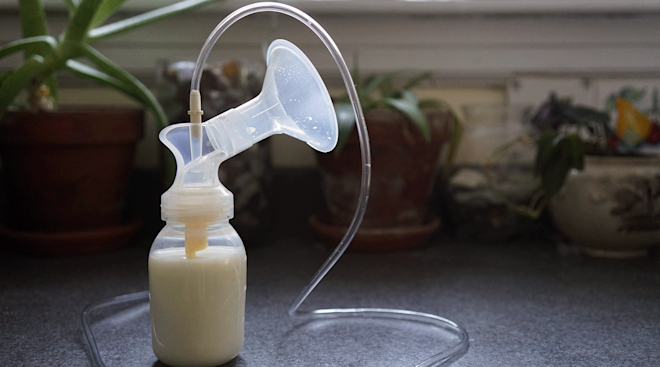Is D-MER the Reason You Feel Sad While Breastfeeding?
Breastfeeding is often portrayed as a beautiful experience. But what if, rather than a sensation of cozy euphoria, you suddenly feel sadness before you nurse baby? It might be a condition called dysphoric milk ejection reflex (D-MER). Unrelated to postpartum depression (PPD) or anxiety, D-MER hasn’t been widely studied—but it’s likely a hormonal response to your let-down, or flow of milk, say experts. Here’s what you should know about D-MER symptoms, treatment and more.
D-MER is an abrupt, intensely negative emotional response that some breastfeeding people experience just before let-down (aka the release of milk), says Alyssa Dweck, MD, ob-gyn and medical advisor for Intimina. It’s typically short-lived, disappearing within 10 minutes of a feeding session. You can experience D-MER regardless of whether you’re breastfeeding or pumping, since both cause the milk-ejection reflex.
A 2019 study suggests that as many as 9 percent of breastfeeding people experience D-MER. But because research and awareness of the condition is pretty limited, it’s possible that this percentage is actually higher.
Dweck says the working theory is that an abrupt hormonal change is at the root of D-MER. According to Cleveland Clinic, as baby suckles or you begin pumping, your body releases oxytocin, the hormone that triggers your let-down reflex. Oxytocin suppresses dopamine. Research indicates that D-MER can happen because, for reasons that aren’t yet completely understood, some people’s dopamine levels drop extremely quickly before let-down. It’s important to remember that D-MER is a physiological response, not a psychological one—so it doesn’t necessarily mean you’re genuinely sad or angry, or that you dislike breastfeeding—although that doesn’t make your symptoms any less real, or worth addressing.
Dweck says D-MER symptoms occur only before or during breastfeeding or pumping, and they may include:
- feelings of sadness or hopelessness
- anxiety
- irritable mood
- diminished self-esteem
- feelings of dread
- anger or agitation
The symptoms are typically mild or moderate, but some people report such severe symptoms that they have to stop breastfeeding, says Dweck. It’s even possible to have feelings of self-harm or suicidal thoughts, she adds, and it’s important to note that if you or someone you know is experiencing these feelings, you should seek medical care right away.
While some people have D-MER over the course of their entire breastfeeding or pumping journey, for most people it resolves within about three months, getting less severe as baby gets older, says Cleveland Clinic. D-MER can also present differently in different people, says Kelli Knight, BSN, RN, IBCLC, a lactation consultant at Houston Methodist Willowbrook Hospital, noting that you might experience symptoms multiple times during one feeding or pumping session if you have more than one let-down.
While it’s possible to have both conditions, D-MER is unrelated to postpartum depression, or PPD. There’s a key difference: PPD symptoms are persistent and long-lasting, while D-MER symptoms are not. “D-MER symptoms are limited to lactation and milk let-down, and resolve very quickly [once let-down stops], even within minutes,” says Dweck. Either way, if you’re experiencing persistent feelings of sadness or have thoughts of harming yourself or baby, it’s important to speak with your provider right away.
There’s no specific test for D-MER, says Dweck. Your doctor will speak to you about your history and symptoms to understand what’s happening. Dweck says providers can usually tell the difference between D-MER and PPD, and she recommends keeping a journal of your symptoms.
Understanding what D-MER is—and that it will pass—is an important part of managing the condition. “Awareness is key to management,” says Knight. Medications are rarely used for D-MER treatment, she adds.
That said, there are a few management and coping techniques experts recommend:
- Do something relaxing. “Some moms found help managing symptoms by listening to relaxing music, warm packs on their shoulders, [a] warm foot soak, aromatherapy, meditation, mindfulness [and] breathing techniques,” says Knight.
- Line up support. Support from your family, friends and support groups, in addition to reassurance from your health-care provider, is key at this time. If you’re struggling, don’t hesitate to ask for help from your loved ones—or to reach out to your provider.
- Find a lactation consultant. A local lactation consultant can also offer support and education, says Knight.
- Keep a journal. Dweck suggests keeping a history of your experiences: Take notes about how you feel and how severe your symptoms are each time you breastfeed or pump, and see if you can identify any patterns.
- Increase skin-to-skin contact. Cleveland Clinic says that bringing baby closer to your body can lower your cortisol levels and decrease your heart rate, promoting a calming effect.
For many, simply knowing that D-MER is a thing—and that it’s fleeting and your feelings will return to normal—helps. Others find that it’s best to stop breastfeeding and switch to formula. While this is a highly personal decision, you shouldn’t feel guilty. You need to take good care of yourself so that you can take good care of baby.
Please note: The Bump and the materials and information it contains are not intended to, and do not constitute, medical or other health advice or diagnosis and should not be used as such. You should always consult with a qualified physician or health professional about your specific circumstances.
Plus, more from The Bump:
Alyssa Dweck, MS, MD, FACOG, is an ob-gyn in Westchester County, New York, and a sexual health and reproductive expert for Intimina, a brand of products focused on women's intimate health. She earned her medical degree from Hahnemann University School of Medicine in Philadelphia, now named Drexel University.
Kelli Knight, BSN, RN, IBCLC, is a lactation consultant at Houston Methodist Willowbrook Hospital in Houston.
Cleveland Clinic, Dysphoric Milk Ejection Reflex (D-MER), April 2023
Clinical Lactation, The Mystery of D-MER: What Can Hormonal Research Tell Us About Dysphoric Milk-Ejection Reflex?, January 2018
Breastfeeding Medicine, Dysphoric Milk Ejection Reflex: A Descriptive Study, November 2019
International Breastfeeding Journal, Dysphoric Milk Ejection Reflex: A Case Report, June 2011
Learn how we ensure the accuracy of our content through our editorial and medical review process.
Navigate forward to interact with the calendar and select a date. Press the question mark key to get the keyboard shortcuts for changing dates.





















































